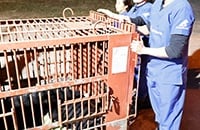Dog thief sentenced to death as dog meat crimes spiral
12 January 2017
Mob violence, murder and social unrest characterise the dog meat trade in China and Vietnam but they could yet prove to be the industry’s weakness.
Animal welfare charity Animals Asia says that while the cruelty behind the meat trade is abhorrent – it’s the industry’s reliance on violence and criminality that could force governments to end the trade to keep the peace.
In the last days of 2016, two 26-year-old men appeared in court in Vietnam’s Thanh Hoa province. One of the young men – both of whom have confessed to being drug addicts – was sentenced to death, the other six years in jail.
The duo had been caught stabbing and stealing a dog by the animal’s horrified owner who chased them before they murdered him with the same knife.
This tragedy is just the latest in a long string of incidents which can be directly traced back to the dog meat trade.
While dogs are considered “property” by Vietnamese law, their theft is not prosecuted, as their value is lower than the $87 threshold.
As a result, stolen dogs have become a mainstay of the dog meat industry supply chain, and fearful owners have taken the law into their own hands.
In late November 2016, villagers in Hung Yen viciously beat a suspected dog thief and locked him in an iron cage.
Earlier in 2016, a mob in Nghe An province beat a dog thief so violently he had to be saved by police and rushed to hospital, leaving the angered dog lovers to take out their frustration on his motorbike.
The latest incidents follow a pattern that has been running for years and previously reported by Animals Asia.
The situation is similar in China. Animals Asia’s 2015 report into the dog meat industry revealed the country contains no large-scale dog breeding farms despite an estimated 10 million dogs being slaughtered for their meat annually.
A large proportion of the animals which end up on dinner plates are stolen pets with bereaved owners increasingly taking the law into their own hands.
Last month villagers in Guilin, Guangxi were reported to have forced a dog thief into a septic tank filled with excrement as punishment for his crime.
In December 2016, a university student was shot by a dog thief’s poison dart in Nanjing city. The woman’s body was temporarily paralyzed while her friend called the police. Officers later apprehended a man who had been out hunting dogs with poisoned darts and had even brought his six-year-old son along.
In November last year, a man trying to evade police crashed into a road toll booth at 4am in Tianjin. Local police had to dispatch 11 police vehicles to apprehend the suspect who was transporting four large German shepherds which had been recently poisoned. The suspect admitted the dogs were to be sold for their meat at a local market.
Animals Asia’s Vietnam Director Tuan Bendixsen said:
“These stories have appeared in the press for a number of years and we don’t expect them to stop any time soon. In fact as exasperation grows so does the violence involved. As long as eating dogs is legal – the violence, killing, criminality and social unrest we have seen over the years will continue. The only way to stop the circle of violence is to end the industry. Ironically it may be we’ll see an end to dog meat eating as a way to protect humans, not dogs.
“What we do know is that this is not an industry that can be regulated. Any legal farming of dogs would simply provide a convenient “front” for the illegal dog trade to continue operating with stolen pets. The dog meat trade is characterised by criminality and cruelty. It’s clearly a trade that Vietnam would be better off without.”
Animals Asia works year round to end the dog and cat meat industries in Vietnam and China where an estimated 5 million and 10 million dogs respectively are reported to be eaten every year.

Animals Asia’s Cat and Dog Welfare Director Irene Feng said:
“It is simply not financially viable to breed dogs for the meat industry legally which prompts suppliers to operate outside the law. We know that the majority of dogs sold for meat are stolen pets and strays snatched from the street with no proof of origin and therefore the potential for serious health risks.
“The only way it will end, and ordinary people with companion animals to be able to live free of violence and fear, is for the dog and cat meat industry to be stopped. We hope that the unending stream of violent stories will lead people to the conclusion that enough is enough. We are certainly seeing a greater awareness that the dog meat being served up is just the final act of cruelty following a list of misdemeanours including theft, violence and even murder.”
BACK







 5 reasons the dog meat trade must end
5 reasons the dog meat trade must end
 New year, new home for Christmas the Bear!
New year, new home for Christmas the Bear!
 Veterinary welfare training – pain management
Veterinary welfare training – pain management